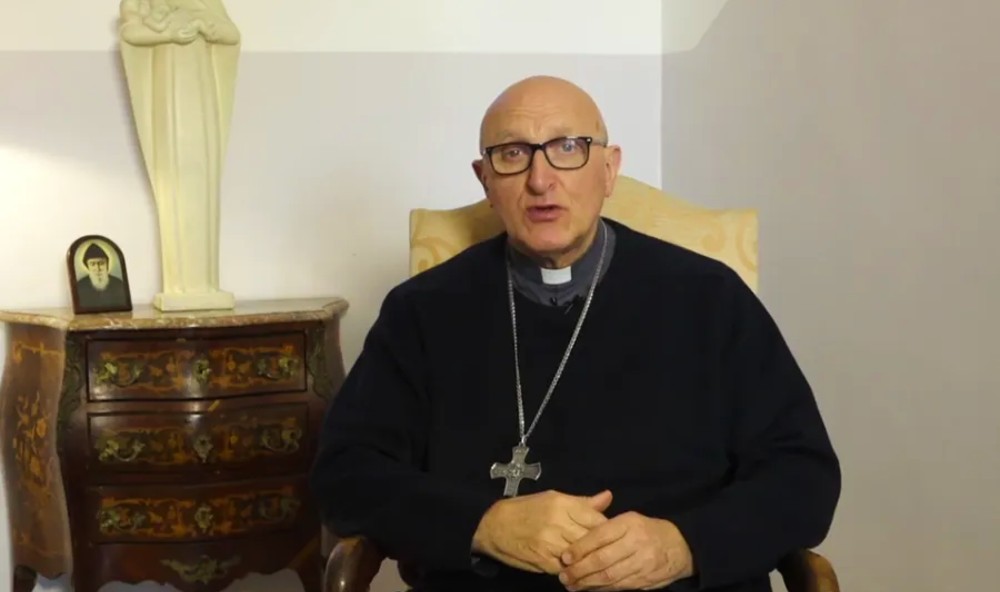We ask you, urgently: don’t scroll past this
Dear readers, Catholic Online was de-platformed by Shopify for our pro-life beliefs. They shut down our Catholic Online, Catholic Online School, Prayer Candles, and Catholic Online Learning Resources—essential faith tools serving over 1.4 million students and millions of families worldwide. Our founders, now in their 70's, just gave their entire life savings to protect this mission. But fewer than 2% of readers donate. If everyone gave just $5, the cost of a coffee, we could rebuild stronger and keep Catholic education free for all. Stand with us in faith. Thank you.Help Now >
Here are four martyrs who died, protecting the seal of confession
FREE Catholic Classes
In recent years, some Catholics have been concerned by pushes from governments in locations such as Louisiana and Australia who challenge the secrecy of the sacrament of confession, asking that priests betray the solemnity of penitents' confessions when they hear of serious crimes in the confessional.

Priests are forbidden to break the seal of confession.
Highlights
Catholic Online (https://www.catholic.org)
8/22/2017 (7 years ago)
Published in Living Faith
Keywords: martyrs, seal of confession
Denver, Colo., (CNA/EWTN News) - However, Catholics should not be afraid, because keeping the secrecy of the sacrament of confession is one of the most important promises priests make.
The code of canon law states that "the sacramental seal is inviolable; therefore it is absolutely forbidden for a confessor to betray in any way a penitent in words or in any manner and for any reason." Priests who violate this seal of confession are automatically excommunicated.
Priests take this solemnity of the seal of confession very seriously; these four priests who died protecting it are witnesses to the extreme lengths to which priests are willing to go to protect the seal of confession.
St. John Nepomucene
Born in Bohemia, or what is now the Czech Republic, between 1340 and 1350, St. John Nepomucene was an example of the protection of sacramental secrecy, being the first martyr who preferred to die rather than reveal the secret of confession.
When he was Vicar General of the Archdiocese of Prague, the now- saint servedas confessor of Sofia of Bavaria, the wife of King Wenceslaus. The king, who had infamous outbursts of anger and jealousy, ordered the priest to reveal the sins of his wife. The saint's refusal infuriated Wenceslaus, who threatened to kill the priest if he did not tell him his wife's secrets.
King Wenceslaus and John Nepomucene came into conflict again when the monarch wanted to seize a convent in order to take its wealth and give it to a relative. The saint prohibited its seizure because those goods belonged to the Church.
Filled with rage, the king ordered the torture of the saint, whose body was then thrown to the Vltava River in 1393.
St. Mateo Correa Magallanes
Saint Mateo Correa Magallanes was another martyr of the seal of confession. He was shot in Mexico during the Cristero War for refusing to reveal the confessions of prisoners rebelling against the Mexican government.
He was born in Tepechitlán in the state of Zacateca on July 22, 1866 and was ordained a priest in 1893. Fr. Matteo served as chaplain in various towns and parishes and was a member of the Knights of Columbus.
In 1927, the priest was arrested by Mexican army forces under General Eulogio Ortiz. A few days later, the general sent Father Correa to hear the confessions group of people who were to be shot. After Fr. Mateo finished administering the sacrament, the general then demanded that the priest reveal what he had heard.
Fr. Mateo responded with a resounding ‽no" and was executed. Currently, his remains are venerated in the Cathedral of Durango.
He was beatified Nov. 22, 1992 and canonized by St. John Paul II May 21, 2000.
Fr. Felipe CĂscar Puig
Fr. Felipe CĂscar Puig was a Valencian priest who is also also considered a martyr of the sacramental seal because he was martyred after keeping confessions secret during the religious persecution of the Spanish Civil War.
During the war, revolutionary and republican forces engaged in violent battles for power, and many Catholics were targeted. This was especially true of the coastal province of Valencia, on the Mediterranean sea.
The Archdiocese of Valencia indicated that, according to the documents collected, Father CĂscar was taken to a prison near the end of August 1936. There, a Franciscan friar named AndrĂ©s Ivars asked that Fr. CĂscar hear his confession before the friar was executed be firing squad.
"After the confession, they tried to extract its contents and before his refusal to reveal it, the militiamen threatened to kill him," says an archdiocesan statement by a witness to the event. The priest then replied, ‽Do what you want but I will not reveal the confession, I would die before that."
"Seeing him so sure, they took him to a sham court where he was ordered to reveal the secrets." Fr. CĂsar remained committed to his position, stating that he preferred to die, and the militiamen condemned him to death. Fathers Felipe CĂscar and AndrĂ©s Ivars were taken by car to another location where they were shot on September 8, 1936. They were 71 and 51 years old, respectively.
Both Felipe CĂscar and AndrĂ©s Ivars are part of the canonization cause of Ricardo Pelufo Esteve and 43 companions.
Fr. Fernando Olmedo Reguera
Fr. Fernando Olmedo Reguera was also a victim of the Spanish Civil War who opted to die rather than break the secrecy of confession.
Born in Santiago de Compostela Jan. 10, 1873 and ordained a priest in the Capuchin Order of Friars Minor on July 31, 1904, Fr. Olmedo was killed Aug. 12, 1936. He served the order as its provincial secretary until 1936, when he had to leave his convent due to the severe religious persecution in the area.
Fr. Olmedo was then arrested, and beaten in prison. He then was pressured into revealing the confessions of others, but Fr. Olmedo did not give in. According to reports, he was shot at a 19th century fortress outside of Madrid by a populist tribunal. His remains are entombed in the crypt of the Church of Jesus of Medinaceli in Madrid, and he was beatified in Tarragona Oct. 13, 2013.
Subscribe Now - Catholic Online YouTube
---
'Help Give every Student and Teacher FREE resources for a world-class Moral Catholic Education'
Copyright 2021 - Distributed by Catholic Online
Join the Movement
When you sign up below, you don't just join an email list - you're joining an entire movement for Free world class Catholic education.
-

-
Mysteries of the Rosary
-
St. Faustina Kowalska
-
Litany of the Blessed Virgin Mary
-
Saint of the Day for Wednesday, Oct 4th, 2023
-
Popular Saints
-
St. Francis of Assisi
-
Bible
-
Female / Women Saints
-
7 Morning Prayers you need to get your day started with God
-
Litany of the Blessed Virgin Mary
Meta's New Commitment to Free Speech and Its Potential Impact on Online Discourse
-

Pope Francis Accepts Resignation of Bishop Dominique Rey of Frejus-Toulon
-

Bound by Betrayal: Katie's Struggle with Lust, Lies, and Redemption
-
John: A Story of Addiction, Hopelessness, and the Search for Redemption
-
Science vs. Faith: The Battle for Truth and Hope
Daily Catholic
 Daily Readings for Wednesday, January 08, 2025
Daily Readings for Wednesday, January 08, 2025 St. Thorfinn: Saint of the Day for Wednesday, January 08, 2025
St. Thorfinn: Saint of the Day for Wednesday, January 08, 2025 Prayer for a Blessing on the New Year: Prayer of the Day for Tuesday, December 31, 2024
Prayer for a Blessing on the New Year: Prayer of the Day for Tuesday, December 31, 2024- Daily Readings for Tuesday, January 07, 2025
- St. Raymond of Pennafort: Saint of the Day for Tuesday, January 07, 2025
- St. Theresa of the Child Jesus: Prayer of the Day for Monday, December 30, 2024
![]()
Copyright 2024 Catholic Online. All materials contained on this site, whether written, audible or visual are the exclusive property of Catholic Online and are protected under U.S. and International copyright laws, © Copyright 2024 Catholic Online. Any unauthorized use, without prior written consent of Catholic Online is strictly forbidden and prohibited.
Catholic Online is a Project of Your Catholic Voice Foundation, a Not-for-Profit Corporation. Your Catholic Voice Foundation has been granted a recognition of tax exemption under Section 501(c)(3) of the Internal Revenue Code. Federal Tax Identification Number: 81-0596847. Your gift is tax-deductible as allowed by law.








 Daily Readings for Wednesday, January 08, 2025
Daily Readings for Wednesday, January 08, 2025 St. Thorfinn: Saint of the Day for Wednesday, January 08, 2025
St. Thorfinn: Saint of the Day for Wednesday, January 08, 2025 Prayer for a Blessing on the New Year: Prayer of the Day for Tuesday, December 31, 2024
Prayer for a Blessing on the New Year: Prayer of the Day for Tuesday, December 31, 2024

